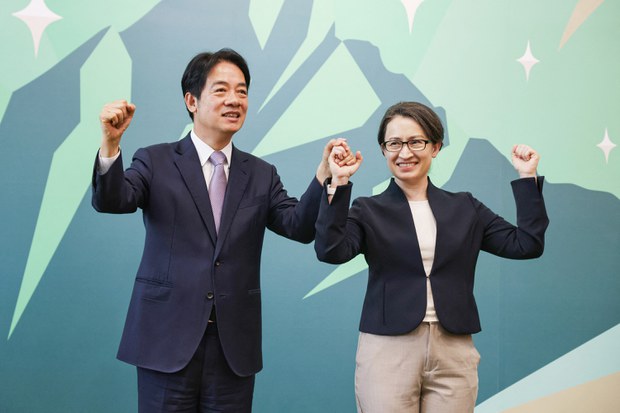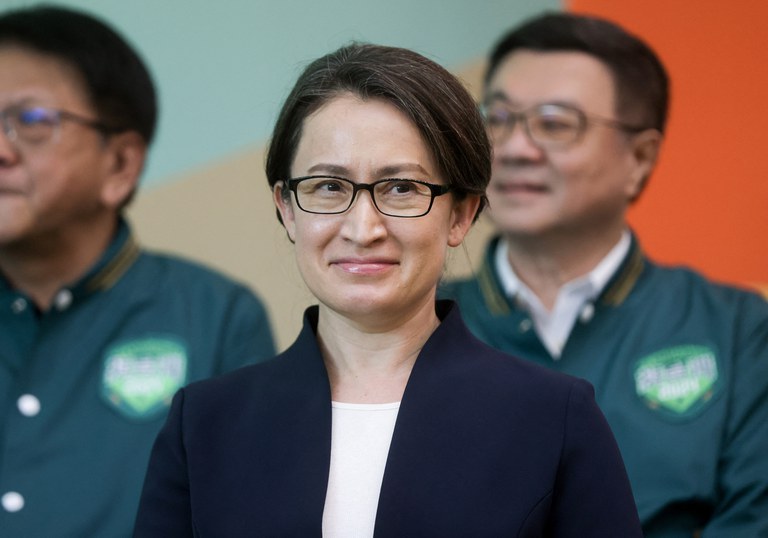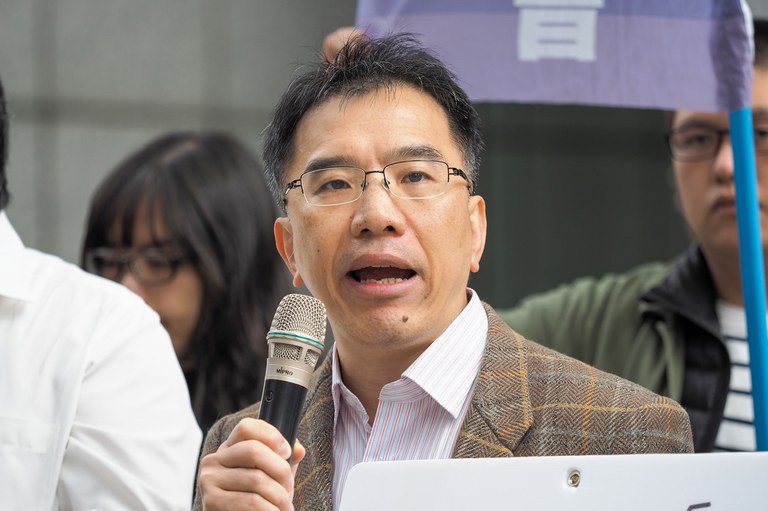Taiwan’s US envoy Hsiao Bi-khim joins 2024 presidential race
Share

Lai Ching-te [left], Taiwan presidential candidate from the Democratic Progressive Party, introduces Hsiao Bi-khim, Taiwan’s representative to the United States, as his running mate in the 2024 election, during a news conference at Lai’s campaign headquarters, in Taipei on Monday, Nov. 20, 2023.
Taiwanese presidential candidate and incumbent vice president Lai Ching-te has confirmed his running mate will be Hsiao Bi-khim, the democratic island’s former envoy in Washington, who has described herself as a “cat warrior” in the face of China’s “wolf-warrior” diplomacy.
“It is my great honor to announce that I’ve chosen @bikhim – a warrior for democracy and one of #Taiwan’s most influential ambassadors – as my running mate,” Lai said via his X account on Monday.
“Fueled by shared commitment, we pledge to build a brighter future for all. Together, we’ll work towards a stronger Taiwan,” he said.
The choice of Hsiao, 52, suggests the ruling Democratic Progressive Party will still be campaigning on a platform of protecting Taiwan’s democratic way of life from China’s territorial ambitions and expanding its diplomatic reach, a platform that brought a landslide victory for outgoing president Tsai Ing-wen in 2020.
Hsiao, who has served as Taipei’s de facto ambassador to the United States and who has been sanctioned as an “independence diehard” by Beijing, said she has shared values with Lai including defending Taiwan’s freedom and democracy.
“I believe we have lots of common convictions – we are both willing to take on responsibility for Taiwan,” she said, according to official footage of the announcement streamed to YouTube.
“I’ve described myself as a cat warrior,” she said. “That’s because, in diplomacy, you have to step cautiously, lightly, but sure-footedly, like a cat.”


She said her decision to run on Lai’s ticket came against a background of “one-sided and constant changes in the status quo made by the other side,” in a reference to Beijing’s escalation of military threats and disinformation campaigns targeting the island as Tsai’s administration continued to forge stronger ties with Washington, in part spurred on by the Russian invasion of Ukraine.
During her tenure in Washington, Hsiao has built a network of strong connections with administration officials despite the lack of formal diplomatic ties with the United States, which switched recognition to Beijing in 1979.
Washington is obliged by the Taiwan Relations Act to help the island defend itself, while the 2022 Taiwan Policy Act allows Washington to provide U.S.$4.5 billion in security assistance over four years.
Hsiao’s tenure has been linked to the development of “the most mutually trusting” relationship with Washington so far, Lai said, adding that Beijing’s criticism of their likely pairing last week showed the Chinese Communist Party’s attempts to involve itself in the presidential race.
The announcement of Lai’s running mate comes amid mounting doubts about the success of a planned opposition pact between the Kuomintang and the Taiwan People’s Party, whose candidates would otherwise split the opposition vote, according to media reports.
With the deadline for candidate registration looming at the end of this week, Taiwan People’s Party presidential candidate Ko Wen-je said on Sunday he intends to remain his party’s presidential candidate, while Kuomintang chairman Eric Chu said the opposition alliance would likely be finalized by Wednesday, sparking widespread doubts that the two parties can yet reach an agreement on who should run for president, Ko or Kuomintang candidate Hou Yu-ih.
Former Democratic Progressive Party lawmaker Lin Chuo-shui said if Lai wins the presidency, Washington will feel it has a strong channel of communication open with Taipei, which is a selling point for the Lai-Hsiao campaign.
Blue-white challenge
But he said if the opposition manages to seal its pact and campaign on a single ticket, it could pose a major threat to the pairing.
“It’s now mainstream politics to campaign on a Taiwanese identity, on defending ourselves against China, and on broadening international diplomatic support for Taiwan,” Lin said.
“That favors the DPP, but any cooperation between the blue [Kuomintang] and white [People’s Party] camps could still pose a big challenge,” he said.
Kuomintang lawmaker Chen I-hsin said a replacement for Hsiao needs to be found in Washington “as soon as possible.”
“A change of general just before the battle is going to have an impact,” he said.
Former Chinese citizen Zola, who is now a permanent resident of Taiwan, said China can’t stand the Lai-Hsiao pairing because both candidates have fairly clean records, and aren’t easy to undermine with disinformation.
“The Communist Party prefers corrupt people, who are easy to influence and control,” he said. “Lai and Hsiao are both democratically elected representatives who can’t be controlled.”
“This is what should happen in a democratic country … The Chinese Communist Party may want ‘unification‘ under a Greater China, but Taiwan’s 23 million people should decide what they want for themselves,” he said.


Chinese president Xi Jinping told President Biden last week that he has no intention of invading Taiwan in the next few years, which some analysts said could weaken any candidate who relies on boosting the island’s defenses as a key plank in their platform.
According to Chen Li-fu, chairman of the Taiwan Association of Professors, the Kuomintang is more likely to be undermined by Xi’s comments, now that Lai’s campaign has chosen to frame national defense as a path to peace and the maintenance of the status quo, while the Kuomintang has tried to appeal to young people who don’t want to be conscripted to serve in a cross-strait war.
“Xi Jinping’s comment to Biden that he has no intention of attacking Taiwan … is tantamount to telling people not to vote for the Democratic Progressive Party,” Chen said.
“But if the Chinese Communist Party isn’t invading, then these young people will never have to fight, so the strategy collapses,” he said, adding that Lai has been careful not to sound too hawkish during his candidacy.
Meanwhile, former defense minister Tsai Ming-hsien has said outright that he “doesn’t believe” Xi, amid an official silence on the topic from Beijing since the leaders met.
Taiwanese military analyst Chieh Chung said it remains to be seen whether the People’s Liberation Army will keep up its military incursions and sabre-rattling around Taiwan, as it has in recent months.
“Taiwanese people are more acutely aware that the Chinese Communist Party’s military aircraft and warships often appear around [the island],” Chieh said. “If this situation doesn’t improve significantly, I think there will still be a sense of crisis among the Taiwanese people.”
“If Beijing keeps going with high-intensity military activity around Taiwan, then people will still feel uneasy that war could break out at any time,” he said.
Translated by Luisetta Mudie.







